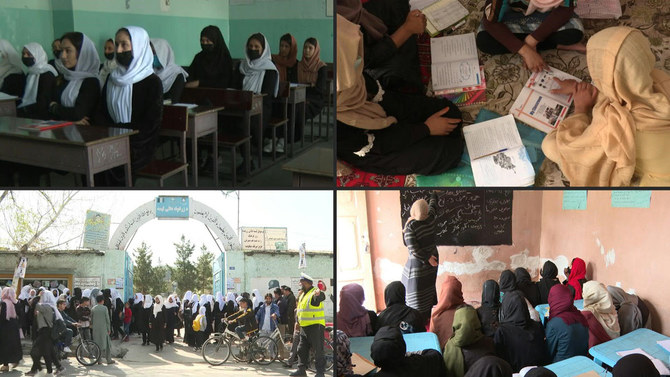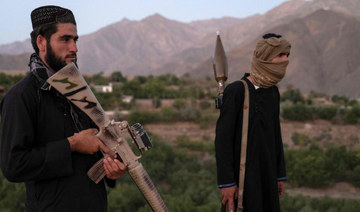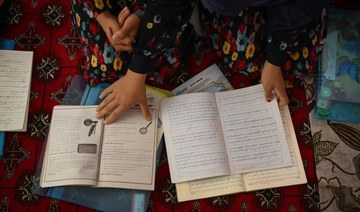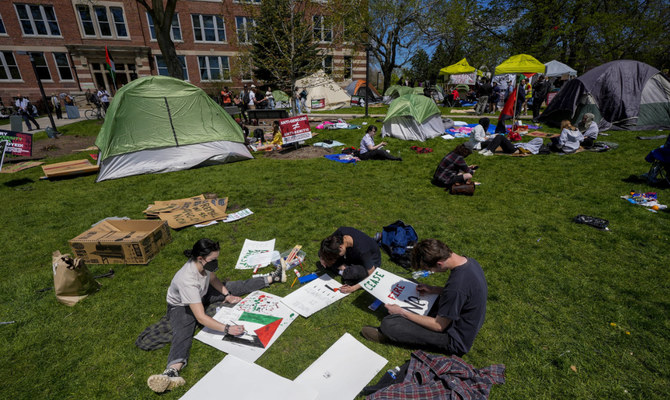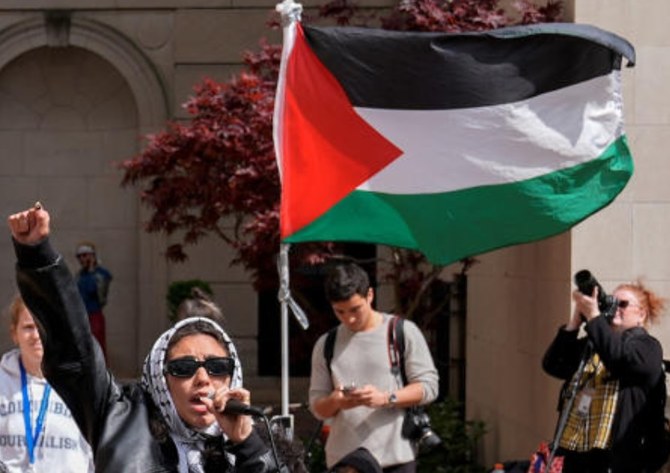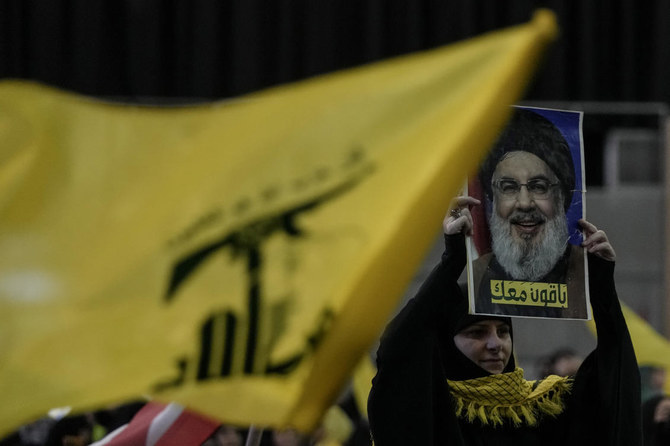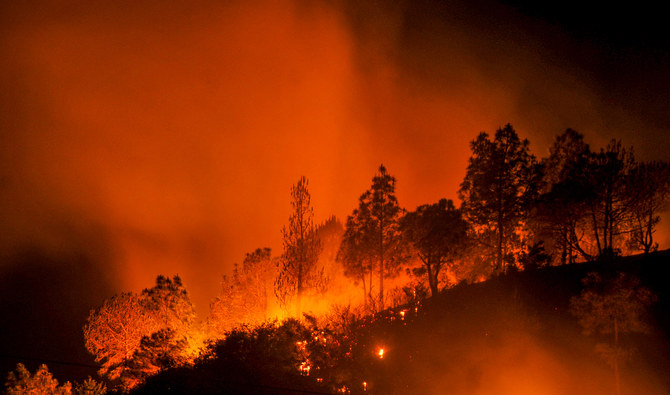KABUL: Nafeesa has discovered a great place to hide her schoolbooks from the prying eyes of her disapproving Taliban brother — the kitchen, where Afghan men rarely venture.
Hundreds of thousands of girls and young women like Nafeesa have been deprived of the chance of education since the Taliban returned to power a year ago, but their thirst for learning has not lessened.
“Boys have nothing to do in the kitchen, so I keep my books there,” said Nafeesa, who attends a secret school in a village in rural eastern Afghanistan.
“If my brother comes to know about this, he will beat me.”
Since seizing power a year ago, the Taliban have imposed harsh restrictions on girls and women to comply with their austere vision of Islam — effectively squeezing them out of public life.
Women can no longer travel on long trips without a male relative to escort them.
They have also been told to cover up with the hijab or preferably with an all-encompassing burqa — although the Taliban’s stated preference is for them to only leave home if absolutely necessary.
And, in the cruellest deprivation, secondary schools for girls in many parts of Afghanistan have not been allowed to reopen.
But secret schools have sprung up in rooms of ordinary houses across the country.
A team of AFP journalists visited three of these schools, interviewing students and teachers whose real names have been withheld for their safety.
This is their story.
Clandestine classroom
Decades of turmoil have played havoc with Afghanistan’s education system, so Nafeesa is still studying secondary school subjects even though she is already 20.
Only her mother and older sister know about it.
Her brother fought for years with the Taliban against the former government and US-led forces in the mountains, returning home after their victory imbued with the hard-line doctrine that says a woman’s place is the home.
He allows her to attend a madrassa to study the Qur'an in the morning, but in the afternoon she sneaks out to a clandestine classroom organized by the Revolutionary Association of the Women of Afghanistan (RAWA).
“We have accepted this risk, otherwise we will remain uneducated,” Nafeesa said.
“I want to be a doctor... We want to do something for ourselves, we want to have freedom, serve society and build our future.”
When AFP visited her school, Nafeesa and nine other girls were discussing freedom of speech with their female teacher, sitting side-by-side on a carpet and taking turns reading out loud from a textbook.
To get to class, they frequently leave home hours earlier, taking different routes to avoid being noticed in an area made up mostly of members of the Pashtun ethnic group, who form the bulk of the Taliban and are known for their conservative ways.
If a Taliban fighter asks, the girls say they are enrolled in a tailoring workshop, and hide their schoolbooks in shopping bags or under their abaya and burqa overgarments.
They not only take risks, but also make sacrifices — Nafeesa’s sister dropped out of school to limit any suspicions her brother might have.
No justification in Islam
Religious scholars say there is no justification in Islam for the ban on girls’ secondary school education and, a year since taking power, the Taliban still insist classes will be allowed to resume.
But the issue has split the movement, with several sources telling AFP a hard-line faction that advises supreme leader Hibatullah Akhundzada opposed any girls’ schooling — or at best, wanted it limited to religious studies and practical classes such as cooking and needlework.
The official line, however, remains that it is just a “technical issue” and classes will resume once a curriculum based on Islamic rules is defined.
Primary girls still go to school and, for now at least, young women can attend university — although lectures are segregated and some subjects cut because of a shortage of female teachers.
Without a secondary school certificate, however, teenage girls will not be able to sit university entrance exams, so this current crop of tertiary female students could be the country’s last for the foreseeable future.
“Education is an inalienable right in Islam for both men and women,” scholar Abdul Bari Madani told AFP.
“If this ban continues, Afghanistan will return to the medieval age... an entire generation of girls will be buried.”
Lost generation
It is this fear of a lost generation that spurred teacher Tamkin to convert her home in Kabul into a school.
The 40-year-old was almost lost herself, having been forced to stop studying during the Taliban’s first stint in power, from 1996 to 2001, when all girls’ schooling was banned.
It took years of self-study for Tamkin to qualify as a teacher, only for her to lose her job at the education ministry when the Taliban returned last year.
“I didn’t want these girls to be like me,” she told AFP, tears rolling down her cheeks.
“They should have a better future.”
With the support of her husband, Tamkin first turned a storeroom into a class.
Then she sold a family cow to raise funds for textbooks, as most of her girls came from poor families and couldn’t afford their own.
Today, she teaches English and science to about 25 eager students.
On a rainy day recently, the girls trickled into her classroom for a biology lesson.
“I just want to study. It doesn’t matter what the place is like,” said Narwan, who should be in grade 12, sitting in a room packed with girls of all ages.
Behind her, a poster on a wall urges students to be considerate: “Tongue has no bones, but it is so strong that it can break the heart, so be careful of your words.”
Such consideration by her neighbors has helped Tamkin keep the school’s real purpose hidden.
“The Taliban have asked several times ‘what’s going on here?’ I have told the neighbors to say it’s a madrassa,” Tamkin said.
Seventeen-year-old Maliha believes firmly the day will come when the Taliban will no longer be in power.
“Then we will put our knowledge to good use,” she said.
'We are not afraid'
On the outskirts of Kabul, in a maze of mud houses, Laila is another teacher running underground classes.
Looking at her daughter’s face after the planned reopening of secondary schools was canceled, she knew she had to do something.
“If my daughter was crying, then the daughters of other parents must also be crying,” the 38-year-old said.
About a dozen girls gather two days a week at Laila’s house, which has a courtyard and a garden where she grows vegetables and fruit.
The classroom has a wide window opening to the garden, and girls with textbooks kept in blue plastic folders sit on a carpet — happy and cheerful, studying together.
As the class begins, one by one they read out the answers to their homework.
“We are not afraid of the Taliban,” said student Kawsar, 18.
“If they say anything, we will fight it out but continue to study.”
But the right to study is not the only aim for some Afghan girls and women — who are all too frequently married off into abusive or restrictive relationships.
Zahra, who attends a secret school in eastern Afghanistan, was married at 14 and now lives with in-laws who oppose the idea of her attending classes.
She takes sleeping pills to fight her anxiety — worried her husband’s family will force him to make her stay home.
“I tell them I’m going to the local bazaar and come here,” said Zahra of her secret school.
For her, she says, it is the only way to make friends.



